See also
- "All Things Come to Pass", song by The Babies (2010)
All Things Must Pass is a 1970 album by George Harrison.
"All Things Must Pass" may also refer to:

Derek and the Dominos was an English–American blues-rock band formed in the spring of 1970 by guitarist and singer Eric Clapton, keyboardist and singer Bobby Whitlock, bassist Carl Radle and drummer Jim Gordon. All four members had previously played together in Delaney & Bonnie and Friends, during and after Clapton's brief tenure with Blind Faith. Dave Mason supplied additional lead guitar on early studio sessions and played at their first live gig. Another participant at their first session as a band was George Harrison, the recording for whose album All Things Must Pass marked the formation of Derek and the Dominos.
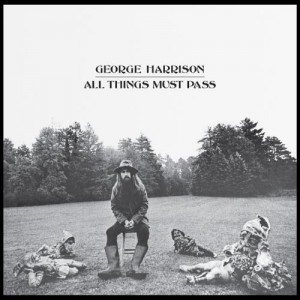
All Things Must Pass is the third studio album by English rock musician George Harrison. Released as a triple album in November 1970, it was Harrison's first solo work after the break-up of the Beatles in April that year. It includes the hit singles "My Sweet Lord" and "What Is Life", as well as songs such as "Isn't It a Pity" and the title track that had been overlooked for inclusion on releases by the Beatles. The album reflects the influence of Harrison's musical activities with artists such as Bob Dylan, the Band, Delaney & Bonnie and Friends and Billy Preston during 1968–70, and his growth as an artist beyond his supporting role to former bandmates John Lennon and Paul McCartney. All Things Must Pass introduced Harrison's signature slide guitar sound and the spiritual themes present throughout his subsequent solo work. The original vinyl release consisted of two LPs of songs and a third disc of informal jams titled Apple Jam. Several commentators interpret Barry Feinstein's album cover photo, showing Harrison surrounded by four garden gnomes, as a statement on his independence from the Beatles.
Wah wah or wah-wah or variants may refer to:
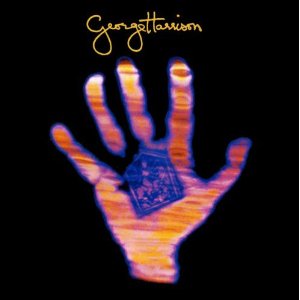
Living in the Material World is the fourth studio album by English musician George Harrison, released in 1973 on Apple Records. As the follow-up to 1970's critically acclaimed All Things Must Pass and his pioneering charity project, the Concert for Bangladesh, it was among the most highly anticipated releases of that year. The album was certified gold by the Recording Industry Association of America two days after release, on its way to becoming Harrison's second number 1 album in the United States, and produced the international hit "Give Me Love ". It also topped albums charts in Canada and Australia, and reached number 2 in Britain.
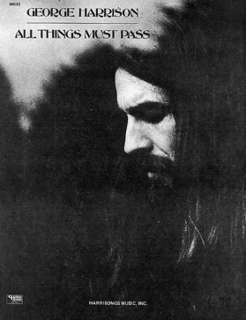
"All Things Must Pass" is a song by English rock musician George Harrison, issued in November 1970 as the title track to his triple album of the same name. Billy Preston released the song originally – as "All Things (Must) Pass" – on his Apple Records album Encouraging Words (1970) after the Beatles had rehearsed the song in January 1969 but overlooked it for inclusion on their Let It Be album. The composition reflects the influence of the Band's sound and communal music-making on Harrison, after he had spent time with the group in Woodstock, New York, in late 1968. In his lyrics, Harrison drew inspiration from Timothy Leary's poem "All Things Pass", a psychedelic adaptation of the Tao Te Ching.

Encouraging Words is the fifth studio album by American soul musician Billy Preston, released in September 1970 on Apple Records. It was the last of Preston's two albums for the Beatles' Apple label, after which he moved to A&M Records. The album was co-produced by George Harrison and Preston. Harrison's songs "All Things Must Pass" and "My Sweet Lord" were issued here for the first time, two months before his own recordings appeared on his triple album All Things Must Pass.

"What Is Life" is a song by English rock musician George Harrison from his 1970 triple album All Things Must Pass. In many countries, it was issued as the second single from the album, in February 1971, becoming a top-ten hit in the United States, Canada and elsewhere, and topping singles charts in Australia and Switzerland. In the United Kingdom, "What Is Life" appeared as the B-side to "My Sweet Lord", which was the best-selling single there of 1971. Harrison's backing musicians on the song include Eric Clapton and the entire Delaney & Bonnie and Friends band, with whom he had toured during the final months of the Beatles. Harrison co-produced the recording with Phil Spector, whose Wall of Sound production also employed a prominent string arrangement by John Barham and multiple acoustic rhythm guitars, played by Harrison's fellow Apple Records signings Badfinger.
"Beware of Darkness" is a song by English rock musician George Harrison from his 1970 triple album All Things Must Pass. It is the opening track on the second disc of the album. The lyrics warn against allowing illusion to get in the way of one's true purpose in life, an admonition that, like the content of "My Sweet Lord", reflects the influence of Harrison's association with the Radha Krishna Temple. Several critics recognise the song as one of the best tracks on All Things Must Pass.

"If Not for You" is a song by American singer-songwriter Bob Dylan from his October 1970 album New Morning. It was also issued as the A-side of a single in Europe in early 1971. The song is a love song to Dylan's first wife, Sara Dylan. He recorded it several times in 1970; the session for the released version took place in New York in August. He also recorded the song with George Harrison on May 1, soon after the break-up of the Beatles, a session that attracted much speculation in the music press. The May recording remained unreleased until its inclusion on The Bootleg Series Volumes 1–3 in 1991.

"Isn't It a Pity" is a song by English rock musician George Harrison from his 1970 solo album All Things Must Pass. It appears in two variations there: one the well-known, seven-minute version; the other a reprise, titled "Isn't It a Pity ". Harrison wrote the song in 1966, but it was rejected for inclusion on releases by the Beatles. In many countries around the world, the song was also issued on a double A-side single with "My Sweet Lord". In America, Billboard magazine listed it with "My Sweet Lord" when the single topped the Hot 100 chart, while in Canada, "Isn't It a Pity" reached number 1 as the preferred side.
"I Live for You" is a song by English rock musician George Harrison originally recorded during the sessions for his All Things Must Pass triple album in 1970. Long available on bootlegs, the song was finally released officially as a bonus track on the 30th anniversary reissue of All Things Must Pass in January 2001. The released recording features only Harrison's lead vocal and Pete Drake's prominent pedal-steel guitar from the 1970 album sessions, with all other instruments overdubbed by Harrison and his son Dhani in 2000. Despite the wealth of unreleased material recorded for All Things Must Pass, it was the only new song included with the album's 2001 reissue. Music critics recognise "I Live for You" as one of many George Harrison compositions that can be interpreted as both a traditional love song and a devotional song.

I Don't Want to Do It is a song written by Bob Dylan and performed by George Harrison for the Porky's Revenge! soundtrack, released in 1985. It was issued as a single in the United States and some other countries, but failed to chart.
"Awaiting on You All" is a song by English musician George Harrison, released on his 1970 triple album, All Things Must Pass. Along with the single "My Sweet Lord", it is among the more overtly religious compositions on All Things Must Pass, and the recording typifies co-producer Phil Spector's influence on the album, due to his liberal use of reverberation and other Wall of Sound production techniques. Harrison recorded the track in London backed by musicians such as Eric Clapton, Bobby Whitlock, Klaus Voormann, Jim Gordon and Jim Price – many of whom he had toured with, as Delaney & Bonnie and Friends, in December 1969, while still officially a member of the Beatles. Musically, the composition reflects Harrison's embracing of the gospel music genre, following his production of fellow Apple Records artists Billy Preston and Doris Troy.

"Let It Down" is a song by English musician George Harrison, released on his 1970 triple album All Things Must Pass. The recording was co-produced by Phil Spector and employs the latter's Wall of Sound production technique to lavish effect. Its brash opening and choruses contrast with the ethereal quality of the verses – a loud/soft approach that has been credited with influencing indie bands during the 1980s and 1990s.
"I'll Still Love You" is a song written by English rock musician George Harrison and first released in 1976 by his former Beatles bandmate Ringo Starr. Produced by Arif Mardin, the track appeared on Starr's debut album for Atlantic Records and Polydor, Ringo's Rotogravure. The composition had a long recording history before then, having been written in 1970 as "Whenever", after which it was copyrighted with the title "When Every Song Is Sung".
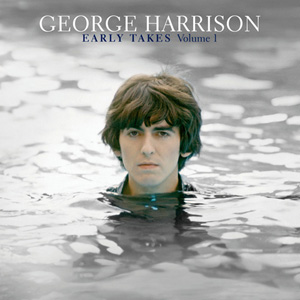
Early Takes: Volume 1 is a compilation album of outtakes and demo recordings by English rock musician George Harrison, released posthumously on 1 May 2012. The recordings appeared in Martin Scorsese's 2011 documentary film George Harrison: Living in the Material World and were originally issued as part of the deluxe version of the DVD release. Producer Giles Martin compiled the album, working with engineer Paul Hicks. The majority of the tracks date from the sessions for Harrison's 1970 triple album All Things Must Pass.

"Apple Scruffs" is a song by English rock musician George Harrison from his 1970 triple album All Things Must Pass. He wrote it as a tribute to the die-hard Beatles fans known as Apple scruffs, who used to wait outside the Apple Corps building and other London locations for a glimpse of the band members. This tradition continued after the group's break-up in April 1970, as the scruffs were a regular presence outside the studios where Harrison recorded his album. The song was also issued on the album's second single, as the B-side to "What Is Life".

Apple Jam is a bonus disc included as the third LP record in English rock musician George Harrison's 1970 triple album All Things Must Pass. It consists of four instrumental jams, three of which were recorded during the album sessions, and "It's Johnny's Birthday", a 30th birthday tribute to John Lennon. The disc was Apple Records' way of placating record buyers for the high retail price of All Things Must Pass, which was one of the first triple albums in rock. It was given a dedicated design by Tom Wilkes, with a logo depicting a jam jar and apple leaves.
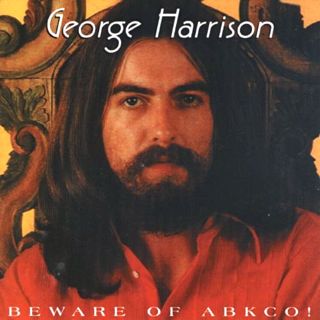
Beware of ABKCO! is a bootleg album of songs performed by English rock musician George Harrison in May 1970. It contains songs that were under consideration for Harrison's triple album All Things Must Pass, his first release as a solo artist following the break-up of the Beatles. The performances were taped in a single session at Abbey Road Studios in London, on 27 May 1970, for the benefit of Harrison's co-producer, Phil Spector. Seven of the fifteen songs were subsequently recorded formally for inclusion on All Things Must Pass, as was "Everybody, Nobody" after Harrison reworked it as "Ballad of Sir Frankie Crisp ". From its 1994 release by Strawberry Records, the bootleg provided the only available record of five songs that Harrison never revisited during his career. Among these is a 1968 collaboration with Bob Dylan titled "Nowhere to Go". All fifteen songs are due to be officially released in August 2021, as part of the Uber and Super deluxe editions of the All Things Must Pass: 50th Anniversary box set.